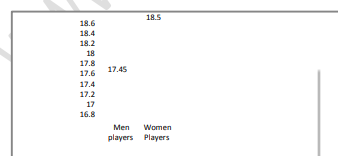A STUDY ON SELF ESTEEM AMONG MEN AND WOMEN VOLLEYBALL PLAYERS
Keywords:
Psychology, Belief, Emotion and SelfAbstract
Self esteem is a term used in psychology to reflect a person's overall emotional evaluation of his or her own worth. It is a judgment of oneself as well as an attitude toward the self. Self-esteem encompasses beliefs and emotions such as triumph, despair, pride and shame. Self-esteem is the experience of being competent to cope with the basic challenges of life and being worthy of happiness. The purpose of the present study was to compare the level of self-esteem among men and women National Volleyball players. The sample for the study consists of 20 men National Volleyball Players and 20 women National Volleyball Players are the Participants in the Federation Cup National Volleyball Championship held at Rajiv Gandhi Indoor Stadium, Pathanamthitta, Kerala during the year 2012-2013. The age of the subjects ranged from 18 to 30 years. To find out their level of self-esteem, Rosenberg Self Esteem Scale (RSES) developed by Rosenberg (1965) was administered on the subjects. ‘t’ test was used to analyze the data. Results of the study revealed no significant difference between men and women National Volleyball Players in regard to Self esteem
Metrics
References
Branden, N. (1969). The psychology of self-esteem. New York: Bantam.
Maslow A. H. (1987). Motivation and Personality (3rd Ed.). New York: Harper & Row.
Bridges, K.A. and Madlem, M.S. (2007). Yoga, Physical Education, and Self-Esteem: Off the Court and On to the Mat for Mental Health. Californian Journal of Health Promotion, 5(2):13-17.
Coatsworth, J.D. and Conroy, D.E. (2006). Enhancing the Self-Esteem of Youth Swimmers through Coach Training: Gender and Age Effects. Psychology of Sport and Exercise, 7(2): 173-192.
Frost, J. and McKelvie, S.J. (2005). The Relationship of Self-Esteem and Body Satisfaction to Exercise Activity for Male and Female Elementary School, High School, and University Students. Athletic Insight: The Online Journal of Sport Psychology, 7(4):36-49.

Downloads
Published
How to Cite
Issue
Section
License
© 2025 International Journal of Behavioral Social and Movement Sciences. All Rights Reserved.
All content published in this journal, including articles, images, and other intellectual property, is protected by copyright law. No part of this publication may be reproduced, distributed, or transmitted in any form or by any means without the prior written permission of the publisher.
For permissions and inquiries, please contact us at: editor@theuniversityacademics.com
License Terms for Publications in International Journal of Behavioral Social and Movement Sciences
By submitting an article to the International Journal of Behavioral Social and Movement Sciences, authors agree to the following terms:
-
License Grant:
-
Authors retain copyright for their work. However, by submitting their work, authors grant the journal a non-exclusive, worldwide, royalty-free license to publish, reproduce, distribute, display, and otherwise use the article in any form and medium (print or digital) in perpetuity.
-
-
Open Access:
-
Articles published in this journal are made freely available to the public under the terms of an open-access license. The journal allows anyone to access, download, copy, distribute, print, search, or link to the full text of the articles.
-
-
Attribution:
-
Authors are required to provide proper citation and attribution to the original article when reusing or referencing content. The attribution should include the author(s), title of the article, journal name, volume, issue, and publication year.
-
-
Reuse of Material:
-
Authors may reuse their published work for non-commercial purposes, including reprinting in other publications or personal websites, provided proper attribution is given to the original publication.
-
-
Creative Commons License:
-
The journal may publish articles under a Creative Commons Attribution 4.0 International License (CC BY 4.0), which allows others to remix, adapt, and build upon the work, even for commercial purposes, as long as they give appropriate credit to the original author(s).
-
-
Peer Review:
-
The submitted article will undergo a thorough peer-review process, and the final decision regarding publication rests with the editorial board of the journal.
-
-
Withdrawal:
-
Once accepted for publication, articles may only be withdrawn with the approval of the editorial board and must not be published elsewhere in any form without prior written consent.
-












